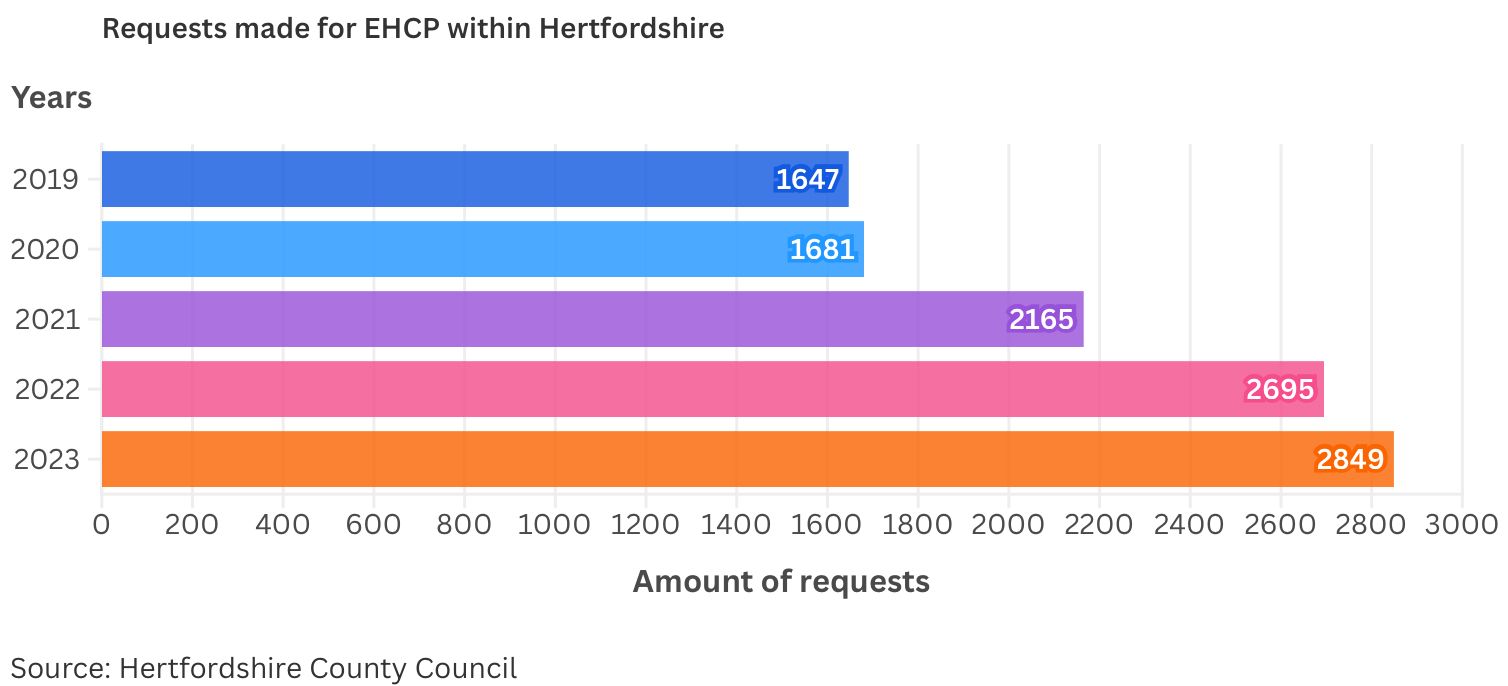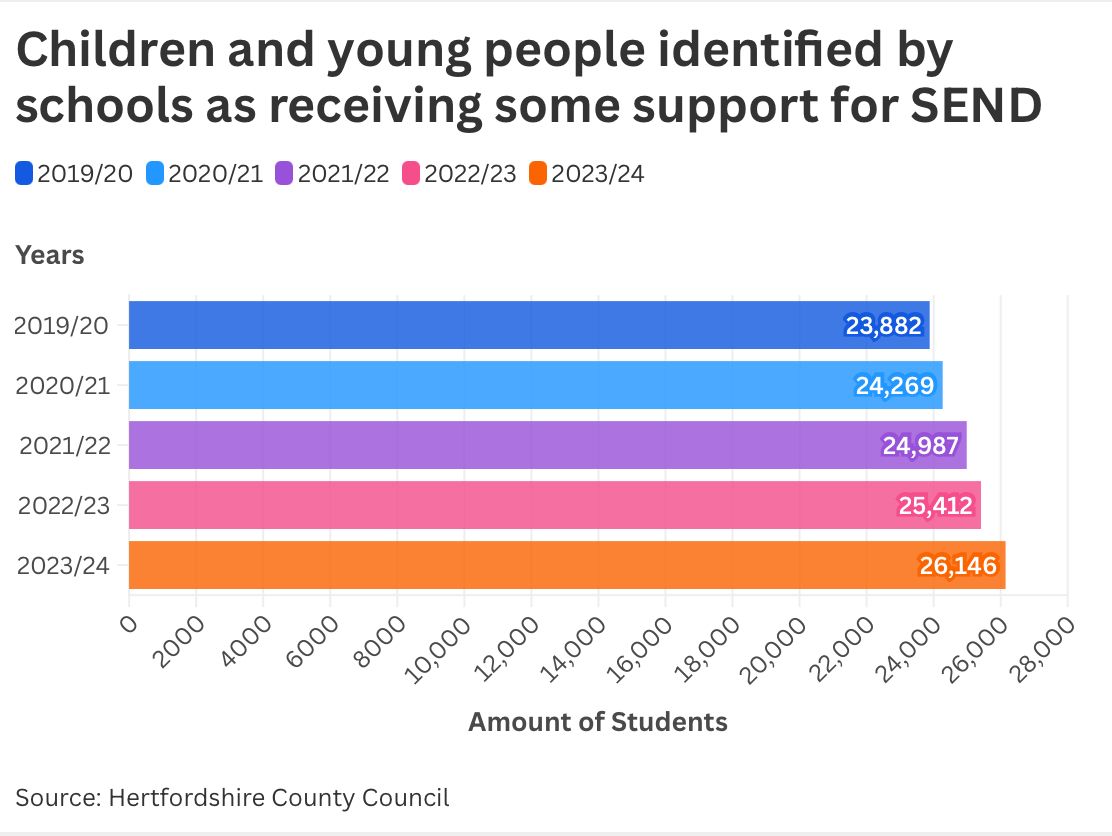Is Hertfordshire failing SEND students?
Why is the SEND department in Hertfordshire receiving criticism?

What is SEND?
In the context of children's education in the UK, "SEND" stands for Special Educational Needs and Disabilities. It refers to children and young people with learning difficulties or disabilities that make it harder for them to learn than most other children of the same age. These difficulties can affect their ability to communicate, socialise, or handle their emotions.
What is an EHCP?
An Education, Health and Care Plan (EHCP) is a legally binding document outlining the specific educational, health, and social care needs of a child or young person aged 0-25 with special educational needs and disabilities (SEND). It details the support they require to help them achieve their potential. EHCPs are created through a formal assessment process and are reviewed regularly.
According to Ofsted and the Care Quality Commission (CQC), the special needs service in Hertfordshire County Council received the lowest possible rating due to "widespread" and "systemic failings" in SEND provision.
This resulted in the lowest possible rating and an improvement notice issued by the government, highlighting areas for priority action and improvement.
The September 2024 meeting of the East and North Hertfordshire NHS Trust revealed that there were 988 children who had been waiting for 104 weeks or longer.
According to the data, 2,288 children and young people had been waiting for at least 78 weeks – and a further of 701 who had been waiting for 65 weeks or longer. Almost 1,000 children in east and north Hertfordshire have been waiting for two years or longer to see a community paediatrician. The report also mentions lengthy delays regarding education, health, and care plans, often of "poor quality".
The inspection identified areas such as long waiting times for assessments, insufficient specialist education places, and poor-quality EHCPs (Education, Health, and Care Plan ) that impact the experiences and outcomes of children and young people with SEND—this was highlighted in the report made available to the public.
Hertfordshires County Councils response to the report was:
"We want to say sorry to you, our families.
"We accept the findings of the report. We understand the scale of the issues, and know that too many children and young people with SEND and their families have not had the service and outcomes they need and deserve.
"We have already put in place strong improvement plans. We are determined to build on them to go further and faster to deliver the improvements needed."
It said its most crucial struggle has been the lack of funding and financial resources.
In response to the inspection by OFSTED and the CQC, the Department for Education issued an improvement notice to Hertfordshire, prompting the county to develop a comprehensive action plan. This plan includes a £7 million annual investment in a SEND Academy for staff training and a £91 million commitment to create more specialist school places over eight years. Progress has been made, with 54% of EHCPs completed within the statutory 20-week timeframe in 2024, up from 40% the previous year.
Both Hertfordshire County Council and the Department of Education have been contacted for comment.
Wooden clock-Taken by Myself, Elizabeth Payne
Wooden clock-Taken by Myself, Elizabeth Payne
Math exercise book Taken by Myself, Elizabeth Payne
Math exercise book Taken by Myself, Elizabeth Payne
Photo of colourful folders Taken by Myself, Elizabeth Payne
Photo of colourful folders Taken by Myself, Elizabeth Payne
blue coloured co-ordinated books Taken by Myself, Elizabeth Payne
blue coloured co-ordinated books Taken by Myself, Elizabeth Payne
Graph showing the requests made for EHCP within Hertfordshire from 2019 to 2023 created on flourish
Graph showing the requests made for EHCP within Hertfordshire from 2019 to 2023.
A spokesperson for Hertfordshire County Council said: “We fully recognise the challenges that some families have faced in accessing the support their children need, and we are truly sorry for the distress this has caused. Every child and young person in Hertfordshire deserves the right support to thrive, and we are committed to making that a reality.
“Since the Ofsted inspection in 2023, we have made significant investments to improve our Special Educational Needs and Disabilities services. This includes recruiting over 100 additional staff, many of whom bring valuable lived experience of SEND as well as investing millions of pounds to strengthen our support for children and young people with EHCPs. We have also committed over £130 million in capital funding since 2018 to expand our local special school capacity, creating more than 750 new places, with further expansion planned to meet growing need.
“While we are confident that the service today is stronger than it has been, we know that not all families are yet feeling the full benefit of these changes. We are listening, learning, and working closely with schools and partners to ensure that improvements are consistent and sustainable.
“It is important to acknowledge that Hertfordshire continues to receive one of the lowest levels of Government funding for High Needs SEND provision. Despite our ongoing efforts to secure fairer funding, the current allocation does not meet the full cost of delivering the support our children deserve.
“This is not just a local issue, it is a national one. We join other councils in calling on the Government to urgently review and increase funding for SEND services, so that every child, in every part of the country, can access the support they need”.
What makes SEND students different to neurotypical students?
Helena, Creator of Shared Strength Network, said: “So I would say that the main difference is probably how they're treated. SEND children have sensory needs, they have processing needs, they function slightly differently, and they process differently, and they see the world in a very different way than normal children.
“But I would say the difference is that a non-SEND child is allowed to be a child and an SEND child is sort of asked to explain themselves or expected to mask their behaviour or make themselves small to fit into environments they don't fit."
Audio interview with Victoria Collins, MP for Harpenden, Berkhamsted and Tring, on her perspective of the SEND system in Hertfordshire.
Audio interview with Victoria Collins, MP for Harpenden, Berkhamsted and Tring, on her perspective of the SEND system in Hertfordshire.
Interview with Helena, founder of Shared Strength Network on her experience with the SEND system in Hertfordshire.
What is the current formula for SEND funding in Hertfordshire?
Each school receives funding through a combination of delegated budgets.
In Hertfordshire, schools are expected to cover up to £6,000 of additional or different support costs for students with SEND from their core budget, with additional funding available for students with Education, Health and Care plans (EHCPs) or Statements of Special Educational Need.
"Special Educational Needs and disabilities (SEND) is an underfunded department that lacks resources." - Victoria Collins MP
According to Victoria Collins, MP for Berkhamsted, Tring, and Harpenden, it would take about 10 years for the fund per capita to become equal between Buckingham and Hertfordshire.
Collins suggested the systematic failure was because "politicians locally and nationally were asleep at the wheel for a long time, that's why now I've been campaigning in Parliament for fairer funding.
"I don't know why the alert wasn't raised or not very loudly by the county council for several years that they didn't have that funding. But I think so clearly, the formula around there has been unfair."
However, Collins pointed out that the County Council is, hopefully, working toward changing the formula and improving the Hertfordshire SEND system.
Hertfordshire has experienced a notable increase of 223% in children and young people with EHCPs since 2015.
In 2023, Herts Parent Carer Involvement ran its second annual survey for all families with a child or young person aged 0-25 with SEND in Hertfordshire.
Families were asked about their experiences during the 22/23 academic year to gauge how well local services identify need, help meet that need, and support improving outcomes for children with SEND.
931 responses were received from across Hertfordshire, covering all age groups, a range of needs, and a variety of education settings.
There is clear dissatisfaction with many services and concerns about the outcomes that are delivered for children and young people. In most cases, parent carers’ views and experiences of SEND services in Hertfordshire have not improved in the last year.
According to a 2024 satisfaction survey, parents of children with special educational needs and disabilities (SEND) rated services in Hertfordshire, on average, 3 out of 10.
EHC Coordinators and/or EHCP administration continue to be the area of most concern for families, followed by Children and Young People’s Mental Health services and the Educational Psychology service.
Overall, the themes and feedback were consistent with those shared in the 2022 survey:
• Concern about waiting times – for both assessment/diagnosis and support/treatment.
• Poor communications from services and between services.
• Inconsistency in meeting needs.
• Many families continue to struggle to find information and support.
Audio interview with Victoria Collins, MP for Harpenden, Berkhamsted and Tring, on her perspective of the SEND system in Hertfordshire.
Audio interview with Victoria Collins, MP for Harpenden, Berkhamsted and Tring, on her perspective of the SEND system in Hertfordshire.



“The funding formula must move with the times. It must be updated to reflect the present, increasing demand. So I ask the Minister: when will the Government change the funding formula to reflect the current need?”
Graph of comparison of Children and young people identified by schools as receiving some support for SEND from the academic year of 2019/20 to 2023/24. Created on Flourish.
Graph of comparsion of Children and young people identified by schools as receiving some support for SEND from the academic year of 2019/20 to 2023/24.
Collins said: "When I was a candidate before I was elected, the one thing that came up on the doorstep across Hertfordshire was parents and families who were struggling to get the right support for their children with special educational needs and disabilities, there was a crisis happening."
She added that many parents and young children contacted her office after waiting for years to get support, education, or a diagnosis.
"Hertfordshire is the third lowest rate of funding per capita in the whole country."
Victoria Collins
MP for Berkhamsted, Tring and Harpenden


Audio interview with Victoria Collins, MP for Harpenden, Berkhamsted and Tring, on her perspective of the SEND system in Hertfordshire.
Audio interview with Victoria Collins, MP for Harpenden, Berkhamsted and Tring, on her perspective of the SEND system in Hertfordshire.
Interview with Childrens Worker and Northchurch Baptist Church, on the youth club they run and the SEND children that attend and the work they do to support them.
Interview with Childrens Worker and Northchurch Baptist Church, on the youth club they run and the SEND children that attend and the work they do to support them.
Interview with Helena, founder of Shared Strength Network on her experience with the SEND system in Hertfordshire.
In 2025, the UK government announced its clear focus on special needs education. It started by asking to hear from those affected by this issue and members of the public to speak about their stories and advice on what the government could do to improve the system.
The government said it plans to improve mainstream education and ensure special schools cater to all needs. There is also the potential for standardising and digitising EHCPs.
Potential areas of reforms:
- The government aims to enhance the expertise and knowledge in mainstream education to support SEND students in a standardised educational environment.
- The government have pledged a 3.5% real terms increase in education spending of £11.2 billion
- The Children’s Wellbeing Bill will give local authorities great powers to manage school admissions, ensuring students are placed in schools that meet their needs.
- A focus will be on preparing students with SEND for mainstream education or adulthood through alternative provisions, with extended specialist task forces offering intensive support.
- Transparency and sharing of data to ensure that they pick up SEND needs earlier and allow more timely support and intervention at a younger age for students.
- A modernised system in the Department for Education, including the Universal Design for Learning guidelines.
Helena reiterated Victoria Collins's statement about the need for reforms. These reforms need to be focused on not just the SEND students but also their family.
Helena said: “It can't just be down to what financially makes sense for the government, and it can't be something that is sort of just putting a bow on the top and trying to make it look pretty."
Her recommendations for reform would be a deep structuring of the system, that is, proactive, not reactive, and a focus on wait times for diagnosis and EHCP.
Helena spoke about the need to evaluate the funding for staff training in mainstream schools and to conduct mandatory training for students with SEND to prevent them from being lost in the system and not fulfilling their potential.
She spoke about parents of SEND students paying for their children's school so that teachers can get training and be equipped to help with their children's and other SEND students' needs.
She described it as: "A wild concept that parents have to take on the education of their children and the support of their children at such a level that they feel that they need to pay the school to get the training to support their child. That is just outrageous."





